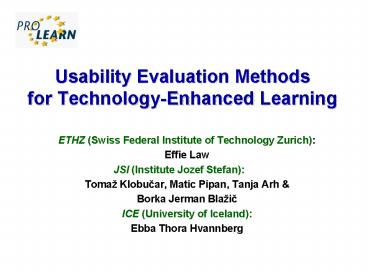Usability Evaluation Methods for TechnologyEnhanced Learning - PowerPoint PPT Presentation
1 / 13
Title:
Usability Evaluation Methods for TechnologyEnhanced Learning
Description:
Limited understanding about the educational effectiveness, practical efficiency ... M14.2: Usability Evaluation of the Common Infrastructure ... – PowerPoint PPT presentation
Number of Views:46
Avg rating:3.0/5.0
Title: Usability Evaluation Methods for TechnologyEnhanced Learning
1
Usability Evaluation Methodsfor
Technology-Enhanced Learning
- ETHZ (Swiss Federal Institute of Technology
Zurich) - Effie Law
- JSI (Institute Jozef Stefan)
- Toma Klobucar, Matic Pipan, Tanja Arh
- Borka Jerman Blaic
- ICE (University of Iceland)
- Ebba Thora Hvannberg
2
Rationales
- Severe usability problems in interactive software
systems, despite 20 years of usability research - Limited understanding about the educational
effectiveness, practical efficiency and user
satisfaction in the usage of technology-enhanced
learning (TEL) systems - Low usability of TEL systems undermines their
applicability - Conventional usability evaluation methods (UEMs)
needs to be adapted and augmented for emerging IT
3
Iterative development cycle
PERVASIVE USABILITY
Evaluation Testing
Design
Requirements
USER
USABILITY
TASK
TOOL
- Early focus on users
- Empirical measurements
- Interplay between
- evaluation and design
CONTEXT
IMPORTANT ROLE OF USABILITY IN RESEARCH
DEVELOPMENT
4
General Objectives
- To bridge the gaps in the current usability
research on investigating the scope and
applicability of different usability evaluation
methods in TEL systems - To bring more science to bear on the field of
usability, which is still young but highly
significant, and consequently drive it towards
maturity
5
Specific Objective
- M14.2 Usability Evaluation of the Common
Infrastructure - D14.12 Report of Usability Evaluation of the
Common Infrastructure of PROLEARN
6
Methods and Results Three Empirical Works
7
Empirical Work 1 - Background
- Title User Rationality and System Learnability
Performing Task Variants in User Tests - Partners ETHZ, JSI
- System EducaNext (http//www.educanext.org)
8
Empirical Work 1 Outcome
- Method
- - 22 participants from ETHZ and JSI
- - Ten tasks of which two were near-identical
(i.e. task variants) - - Quantitative (e.g. time-on-task) and
qualitative data (e.g. think-aloud protocols) - Main Finding
- - Including task variants in user tests can
provide more valid and reliable assessment of
usability, especially learnability - Main Publications
- - Behaviour Information Technology
- - Journal of the American Society for
Information Science and Technology
9
Empirical Work 2 Background
- Title Evaluation of Personalized Search Engine
- Partners ETHZ, JSI
- System ELENA Human Capital Development Suite
(http//www.hcd-online.com/HCDExp/ubp)
10
Empirical Work 2 Outcome
- Method
- - 22 participants from JSI, ETHZ, WUW, ZSI, and
UPM - - Seven search tasks general, goal-specific and
interest-specific - - Compare system-defined and user-defined
rankings - Main Finding
- - Extent of within- and between-user
(in)consistency - - Flaws in relevance measurement methods
- Main Publication
- - Conference on Human Factors in Computing
Systems (CHI 2006), (under review)
11
Empirical Work 3 Background
- Title Classification of Usability Problems (CUP)
Scheme - Partners ETHZ, ICE
- System UGAL (Owl Teaching Web Version 2.0)
12
Empirical Work 3 Outcome
- Method
- - 11 students for user testing baseline
measures - - 8 faculty for applying CUP reliability
measures - - 2 developers for evaluating CUP validity
measures - Main Finding
- - Established reliability and validity of CUP
- - Further improvement of CUP
- Main Publication
- - Refereed book chapter User-centred Design of
Online Learning Communities, IDEA Publishing Co.
(under review)
13
Social Network Analysis
- Partners ETHZ, ZSI
- Aim Investigate the evolution of PROLEARN
- Expected outcomes
- Visualization of integration patterns
- Insights into computer-supported collaborative
work - Please complete the Questionnaire ?































